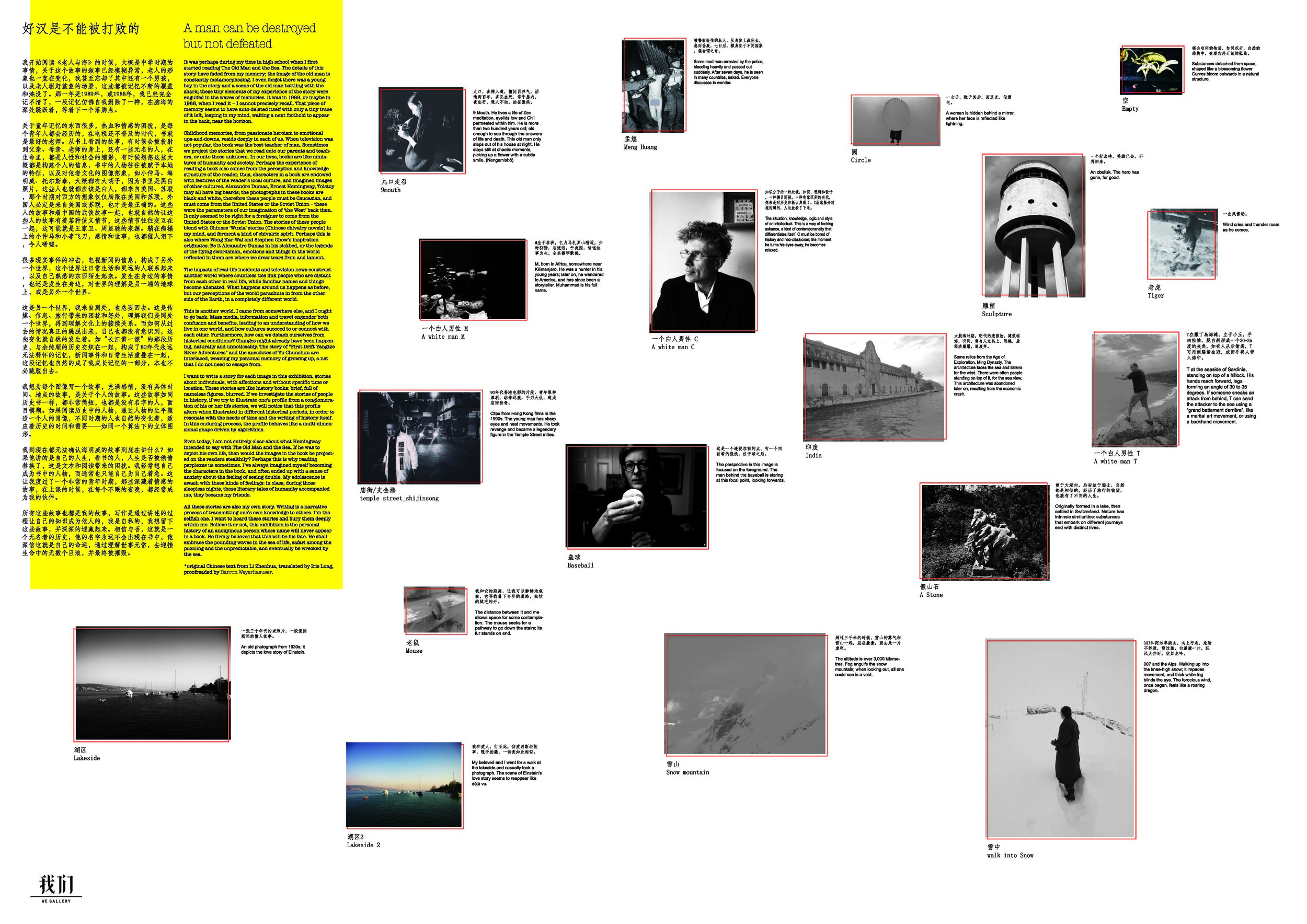
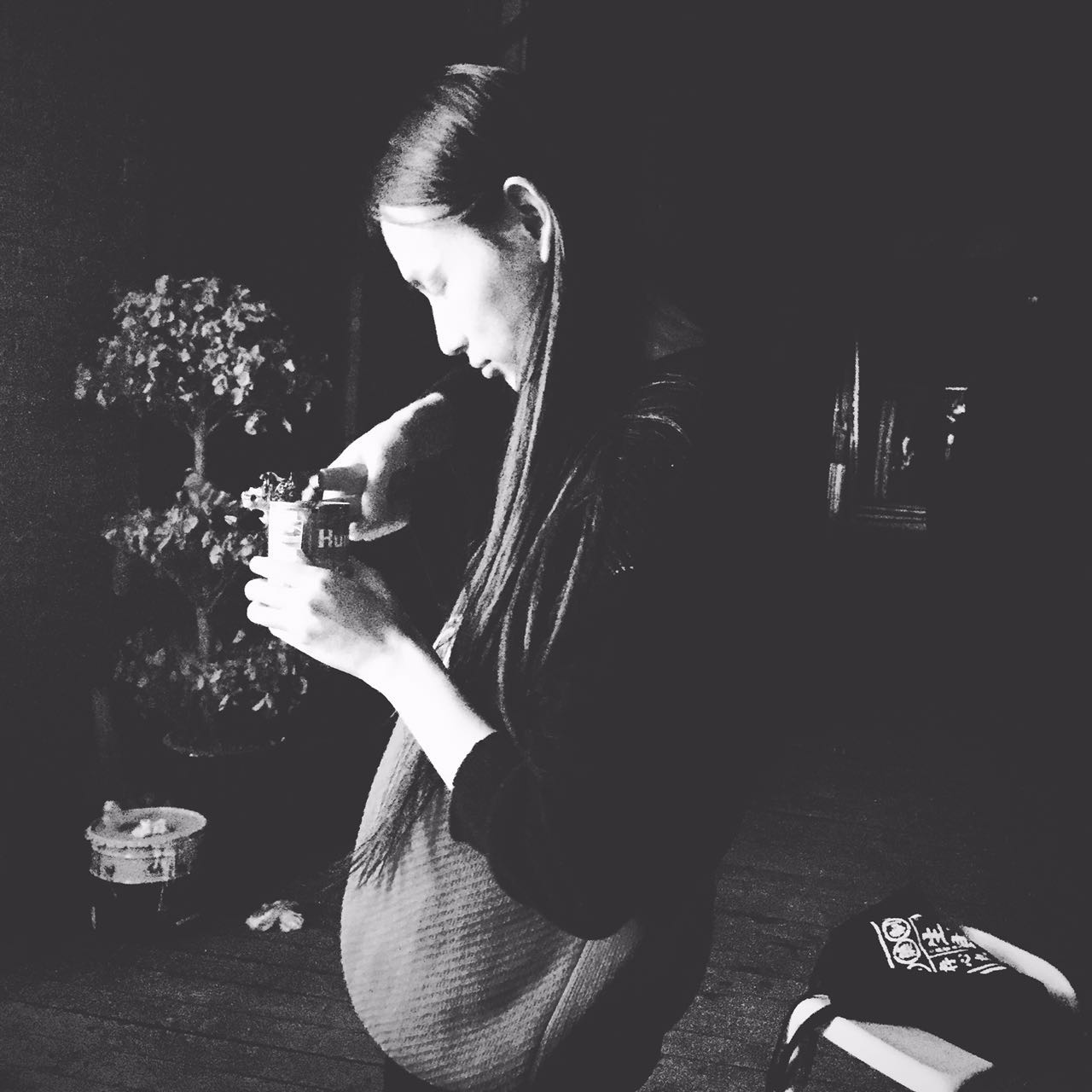







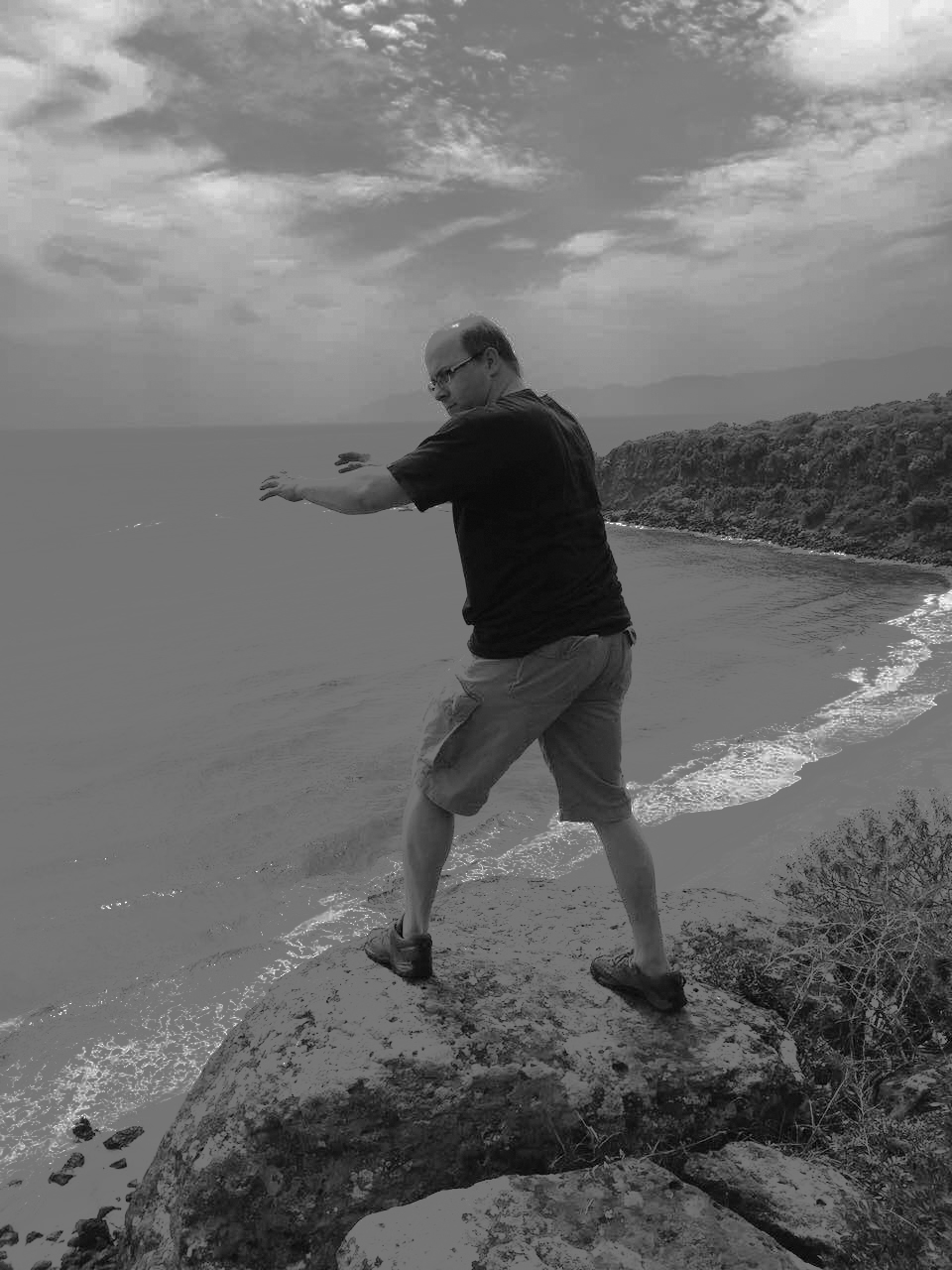




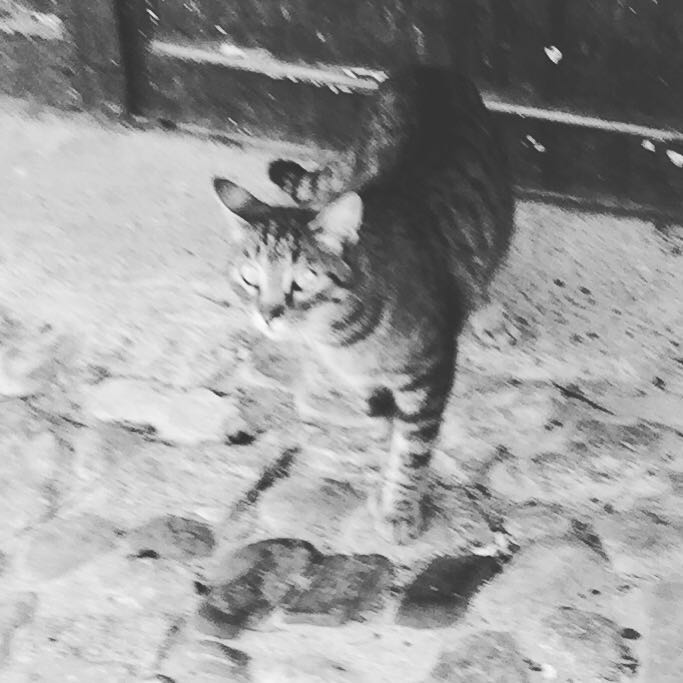



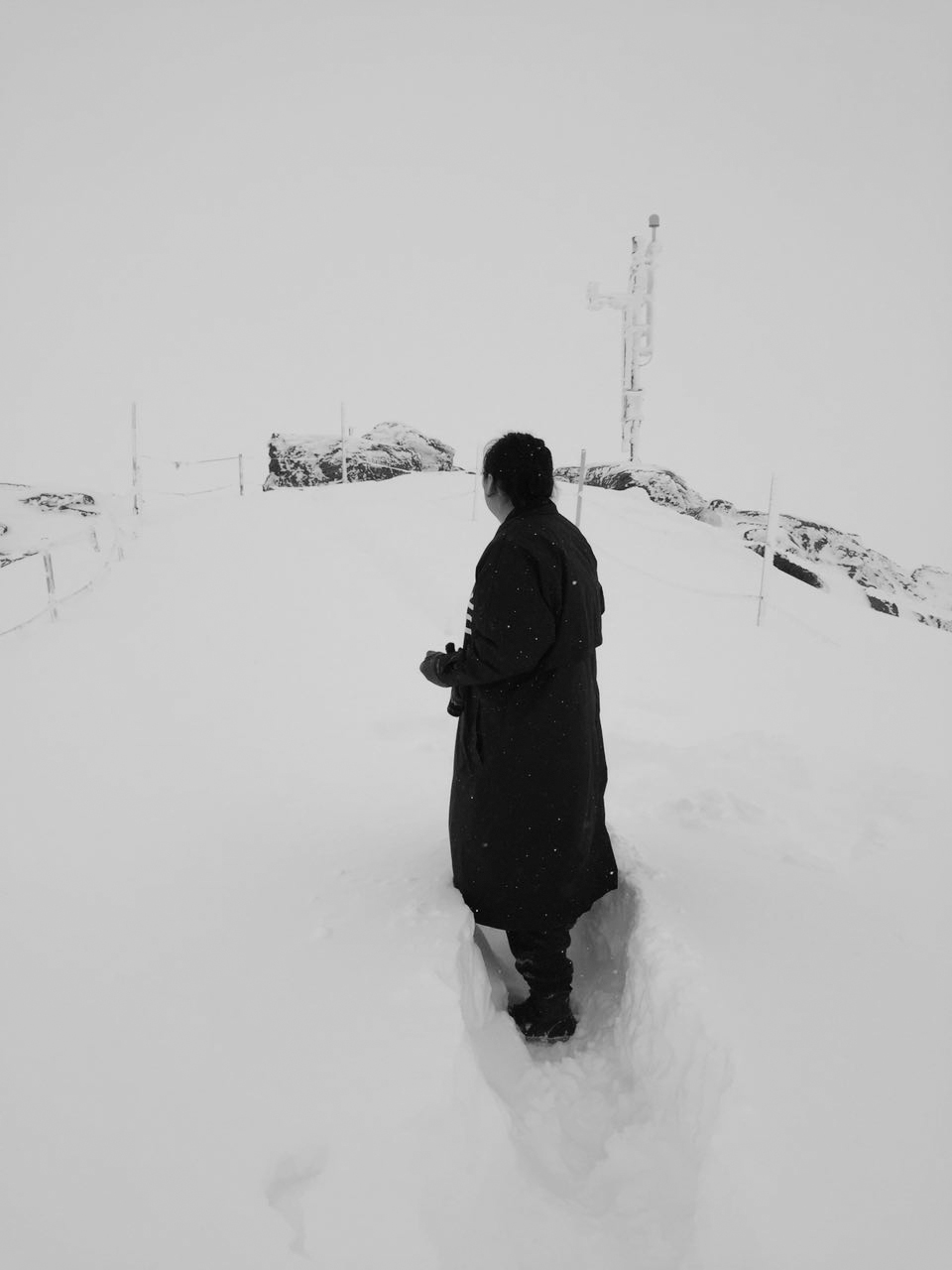




+
A set of 17 Platinum prints + 1 digital print
铂⾦⼿⼯图⽚⼗七张加⼀张数码打印
媒介尺幅
500mm X 400mm
all the art works produced in 2016
所有作品完成于⼆零⼀六年
Edition of 50
五⼗个版
Li Zhenhua
李振华
-
A man can be destroyed but not defeated
It was perhaps during my time in high school when I first started reading The Old Man and the Sea. The details of this story have faded from my memory; the image of the old man is constantly metamorphosing. I even forgot there was a young boy in the story and a scene of the old man battling with the shark; these tiny elements of my experience of the story were engulfed in the waves of memories. It was in 1989, or maybe in 1988, when I read it -- I cannot precisely recall. That piece of memory seems to have auto-deleted itself with only a tiny trace of it left, leaping in my mind, waiting a next foothold to appear in the back, near the horizon.
Childhood memories, from passionate heroism to emotional ups-and-downs, reside deeply in each of us. When television was not popular, the book was the best teacher of man. Sometimes we project the stories that we read onto our parents and teachers, or onto those unknown. In our lives, books are like miniatures of humanity and society. Perhaps the experience of reading a book also comes from the perception and knowledge structure of the reader, thus, characters in a book are endowed with features of the reader’s local culture, and imagined images of other cultures. Alexandre Dumas, Ernest Hemingway, Tolstoy may all have big beards; the photographs in these books are black and white, therefore these people must be Caucasian, and must come from the United States or the Soviet Union – these were the parameters of our imagination of ‘the West’ back then. It only seemed to be right for a foreigner to come from the United States or the Soviet Union. The stories of these people blend with Chinese ‘Wuxia’ stories (Chinese chivalry novels) in my mind, and ferment a kind of chivalric spirit. Perhaps this is also where Wong Kar-Wai and Stephen Chow’s inspiration originates. Be it Alexandre Dumas in his sickbed, or the legends of the flying swordsman, emotions and things in the world reflected in them are where we draw tears from and lament.
The impacts of real-life incidents and television news construct another world where countless ties link people who are distant from each other in real life, while familiar names and things become alienated. What happens around us happens as before, but our perceptions of the world parachute in from the other side of the Earth, in a completely different world.
This is another world. I came from somewhere else, and I ought to go back. Mass media, information and travel engender both confusion and benefits, leading to an understanding of how we live in one world, and how cultures succeed to or connect with each other. Furthermore, how can we detach ourselves from historical conditions? Changes might already have been happening, naturally and unnoticeably. The story of “First Drift Yangtze River Adventures” and the anecdotes of Yu Chunshun are interlaced, weaving my personal memory of growing up, a net that I do not need to escape from.
I want to write a story for each image in this exhibition; stories about individuals, with affections and without specific time or location. These stories are like history books: brief, full of nameless figures, blurred. If we investigate the stories of people in history, if we try to illustrate one’s profile from a conglomeration of his or her life stories, we will notice that this profile alters when illustrated in different historical periods, in order to resonate with the needs of time and the writing of history itself. In this enduring process, the profile behaves like a multi-dimensional shape driven by algorithms.
Even today, I am not entirely clear about what Hemingway intended to say with The Old Man and the Sea. If he was to depict his own life, then would the images in the book be projected on the readers stealthily? Perhaps this is why reading perplexes us sometimes. I’ve always imagined myself becoming the characters in the book, and often ended up with a sense of anxiety about the feeling of seeing double. My adolescence is awash with these kinds of feelings: in class, during those sleepless nights, those literary tales of humanity accompanied me, they became my friends.
All these stories are also my own story. Writing is a narrative process of transmitting one’s own knowledge to others. I’m the selfish one. I want to hoard these stories and bury them deeply within me. Believe it or not, this exhibition is the personal history of an anonymous person whose name will never appear in a book. He firmly believes that this will be his fate. He shall embrace the pounding waves in the sea of life, safari among the puzzling and the unpredictable, and eventually be wrecked by the sea.
*original Chinese text from Li Zhenhua, translated by Iris Long, proofread by Barron Weyerhaeuser.
好汉是不能被打败的
我开始阅读《⽼⼈与海》的时候,⼤概是中学时期的事情,关于这个故事的叙事已经模糊异常,⽼⼈的形象也⼀直在变化,我甚⾄忘却了其中还有⼀个男孩,以及⽼⼈驱赶鲨鱼的场景,这些都被记忆不断的覆盖和淹没了。那⼀年是1989年,或1988年,我已经完全记不清了,⼀段记忆仿佛⾃我删除了⼀样,在脑海的深处跳跃着,等着下⼀个落脚点。
关于童年记忆的东西很多,热⾎和情感的困扰,是每个青年⼈都会经历的,在电视还不普及的时代,书就是最好的⽼师。从书上看到的故事,有时候会被投射到⽗亲、母亲、⽼师的⾝上,还有⼀些⽆名的⼈,在⽣命⾥,都是⼈性和社会的缩影,有时候想想这些⼤概都是构建个⼈的信息,书中的⼈物往往被赋予本地的特征,以及对他者⽂化的图像想象,如⼩仲马、海明威、托尔斯泰,⼤概都有⼤胡⼦,因为书⾥是⿊⽩照⽚,这些⼈也就都应该是⽩⼈,都来⾃美国、苏联,那个时期对西⽅的想象仅仅局限在美国和苏联,外国⼈必定是来⾃美国或苏联,也才是最正确的。这些⼈的故事和着中国的武侠故事⼀起,也就⾃然的让这些⼈的故事有着某种侠义情节,这些情节往往交互在⼀起,这可能就是王家卫、周星驰的来源。躺在病榻上的⼩仲马和⼩李飞⼑,感情和世事,也都催⼈泪下,令⼈唏嘘。
很多现实事件的冲击,电视新闻的信息,构成了另外⼀个世界,这个世界让⽇常⽣活和更远的⼈联系起来,以及⾃⼰熟悉的东西陌⽣起来。发⽣在⾝边的事情,也还是发⽣在⾝边,对世界的理解是另⼀端的地球上,或是另外⼀个世界。
这是另⼀个世界,我来⾃别处,也总要回去。这是传媒、信息、旅⾏带来的困扰和好处,理解我们是同处⼀个世界,再到理解⽂化上的接续关系。⽽如何从过去的情况真正的跳脱出来,⾃⼰也都没有意识到,这些变化就⾃然的发⽣着。如“长江第⼀漂”的那段历史,与余纯顺的历史交织在⼀起,构成了80年代永远⽆法释怀的记忆,新闻事件和⽇常⽣活重叠在⼀起,这段记忆也⾃然的成了我成长记忆的⼀部分,本也不必跳脱出去。
我想为每个图像写⼀个故事,充满感情,没有具体时间、地点的故事,是关于个⼈的故事。这些故事如同历史书⼀样,都⾮常简短,也都是没有名字的⼈,⾯⽬模糊。如果阅读历史中的⼈物,通过⼈物的⽣平塑造⼀个⼈的肖像,不同时期的⼈也⾃然的变化着,适应着历史的时间和需要——如同⼀个算法下的⽴体图形。
我到现在都⽆法确认海明威的故事到底在讲什么?如果他讲的是⾃⼰的⼈⽣,看书的⼈,⼈⽣是否被偷偷替换了,这是⽂本和阅读带来的困扰。我经常想⾃⼰成为书中的⼈物,⽽通常也只能⾃⼰为⾃⼰着急。这让我度过了⼀个⾮常的青年时期,那些深藏着情感的故事,在上课的时候,在每个不眠的夜晚,都经常成为我的伙伴。
所有这些故事也都是我的故事,写作是通过讲述的过程让⾃⼰的知识成为他⼈的,我是⾃私的,我想留下这些故事,并深深的埋藏起来。相信与否,这就是⼀个⽆名者的历史,他的名字永远不会出现在书中,他深信这就是⾃⼰的命运,通过理解世事⽆常,去迎接⽣命中的⽆数个巨浪,并最终被摧毁。

9 Mouth. He lives a life of Zen meditation, eyelids low and Ch’i permeated within him. He is more than two hundred years old; old enough to see through the answers of life and death. This old man only steps out of his house at night. He stays still at chaotic moments, picking up a flower with a subtle smile. (Nengemishō)
九口,参禅入道,擅闭目养气,活逾两百年,多见生死,常于屋内,夜出行,遇人不动,拈花微笑。

Some mad man arrested by the police, bleeding heavily and passed out suddenly. After seven days, he is seen in many countries, naked. Everyone discusses in wonder.
被警察捉住的狂人,从身体上流出血,忽而昏厥,七日后,裸身见于不同国家,观者谓之奇。

A woman is hidden behind a mirror, where her face is reflected like lightning.
一女子,隐于其后,面反光,似雷电。

Substances detached from space, shaped like a blossoming flower. Curves bloom outwards in a natural structure.
褪去空间的物质,如同花开,自然的结构中,有着向外开放的弧线。

M, born in Africa, somewhere near Kilimanjaro. He was a hunter in his young years; later on, he wandered to America, and has since been a storyteller. Muhammad is his full name.
M生于非洲,乞力马扎罗山附近,少时狩猎,后流浪,于美国,讲述故事为生,全名穆罕默德。

The situation, knowledge, logic and style of an intellectual. This is a way of looking askance, a kind of contemporaneity that differentiates itself. C must be bored of history and neo-classicism; the moment he turns his eyes away, he becomes relaxed.
知识分子的一种处境,知识、逻辑和设计,一种侧目而视,一种有意区别的当代,想来是对历史和新古典倦了,C故意躲开对视的瞬间,人也放松了下来。

Some relics from the Age of Exploration, Ming Dynasty. The architecture faces the sea and listens for the wind. There were often people standing on top of it, for the sea view. This architecture was abandoned later on, resulting from the economic crash.
大航海时期,明代的遗留物,建筑临海,听风,常有人立其上,远眺,后经济崩塌,遂废弃。

T at the seaside of Sardinia, standing on top of a hillock. His hands reach forward, legs forming an angle of 30 to 35 degrees. If someone sneaks an attack from behind, T can send the attacker to the sea using a “grand battement derrière”, like a martial art movement, or using a backhand movement.
T在撒丁岛海滩,立于小丘,手向前推,腿自然形成一个30-35度的夹角,如有人从后偷袭,T可用倒踢紫金冠,或回手将人带入海中。

Originally formed in a lake, then settled in Switzerland. Nature has intrinsic similarities: substances that embark on different journeys end with distinct lives.
曾于大湖内,后安放于瑞士,自然都是相似的,经历了旅行的物质,也就有了不同的人生。

Clips from Hong Kong films in the 1990s. The young man has sharp eyes and neat movements. He took revenge and became a legendary figure in the Temple Street milieu.
90年代香港电影的片段,青年眼神犀利,动作迅捷,手刃大仇,遂成庙街传奇。

The distance between it and me allows space for some contemplation. The mouse seeks for a pathway to go down the stairs; its fur stands on end.
我和它的距离,让我可以静静地观察,它寻找着下台阶的道路,松软的绒毛炸开。

The altitude is over 3,000 kilometres. Fog engulfs the snow mountain; when looking out, all one could see is a void.
超过三千米的时候,雪山的雾气和雪山一起,层层叠叠,望去是一片虚空。

An old photograph from 1930s; it depicts the love story of Einstein.
一张三十年代的老照片,一段爱因斯坦的情人故事。

My beloved and I went for a walk at the lakeside and casually took a photograph. The scene of Einstein’s love story seems to reappear like déjà vu.
我和爱人,行至此,仿爱因斯坦故事,随手拍摄,一切竟如此相似。

The perspective in this image is focused on the foreground. The man behind the baseball is staring at this focal point, looking forwards.
这是一个透视在前的点,有一个向前看的视线,位于球之后。

007 and the Alps. Walking up into the knee-high snow; it impedes movement, and thick white fog blinds the eye. The ferocious wind, once begun, feels like a roaring dragon.
007和阿尔卑斯山,向上行走,危险不能进,雪过膝,白濛濛一片,狂风大作时,犹如龙吟。
